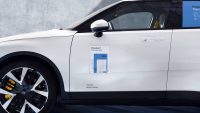Car production in the UK dropped by just 0.3 per cent in January but EV output soared by almost half, according to figures released today by the SMMT.
The trade body said 68,575 units were manufactured in total – 215 fewer than in January 2022.
Of that figure, 28,329 comprised battery-electric, plug-in hybrid and hybrid-electric vehicles, which was a 49.9 per cent increase for that sector.
More than four out of every 10 cars – 41.3 per cent – made last month were electrified, which the SMMT said was a near-record monthly share. Most of the electrified models – 77 per cent – are exported.
The overall decrease was mainly driven by structural changes, reflecting a move from car- to van-making at one major plant, although supply chain shortages were still hitting some manufacturers, it added.
Production for the domestic market increased by 5.6 per cent to 12,196 units.
Exports, however, fell by 1.5 per cent to 56,379 cars, largely because shipments to Russia had been suspended – that alone accounted for 83.6 per cent of the loss.
More than half of the exports (56.6 per cent) went to the EU, followed by the US at 9.3 per cent, China (8.8 per cent), Japan (4.4 per cent) and Australia (3.3 per cent).
SMMT chief executive Mike Hawes said: ‘Automotive manufacturing can drive long-term growth for the low-carbon economy but the sector needs competitive conditions to attract investment.
‘Recent global developments, however, suggest increasing protectionism which, if not challenged or mitigated, could put the UK at a disadvantage.
‘To deliver a wholesale industrial transformation, we need a competitive framework and a pitch that promotes advanced vehicle manufacturing internationally.
‘We now look to the forthcoming Budget for the necessary measures that will enable the automotive sector to deliver its undoubted potential.’
The SMMT said the latest independent outlook anticipated UK car output rising by nine per cent to 842,200 cars this year, driven by growth in electrified vehicle production.
By 2025, car and LCV production volumes are predicted to surpass one million vehicles, it added.
What the industry says
We face being left behind
In the long run, the UK is in competition against several countries when it comes to manufacturing hubs and assembly lines for electric vehicles.
As the collapse of the Britishvolt gigafactory showed, to succeed in attracting the right investment, there needs to be substantial government incentives and support.
The Inflation Reduction Act in the US has shown how impactful government support and protectionist policies can be for manufacturers.
If we don’t follow suit and provide similar support to our industry, there’s no question that we will be left behind.
Jim Holder, editorial director, What Car?
General outlook is positive
Strong new registration figures in January indicate that manufacturing is starting to recover as the industry aims to get back to pre-pandemic levels.
Though supply constraints and other resource limitations will continue to make this year challenging, the general outlook is positive as the backlog of orders begins to clear and production levels rise.
Lisa Watson, director of sales, Close Brothers Motor Finance
Predictions are far cry from halcyon days
Current predictions hold that we will manufacture 842,000 cars this year – up nine per cent on 2022, but a far cry from the halcyon days of 2016 when we built over 1.7m.
The right models are certainly being made here, though, with two-fifths of all production last month being hybrid or electric cars.
Hugo Griffiths, consumer editor, Carwow
UK is less attractive than elsewhere for manufacturing
Medium-to-longer-term questions remain unanswered for the industry, despite investing over £10bn in electric vehicle capability since 2011.
At present, the UK is proving a less attractive proposition for new vehicle manufacturing facilities, due to relatively high labour and energy costs and access to raw materials and chemicals.
While the UK is a global leader in high-value skills and research, in a globally competitive environment the government and local industry need to do more to show that it can be a viable manufacturing base for battery and electric vehicle manufacturing at scale.
Richard Peberdy, head of automotive, KPMG
Car Dealer Live – the future of the car dealer – exclusive conference features talks from leading car dealers, Google and Auto Trader among much more. Find out the full event details and book tickets.



































